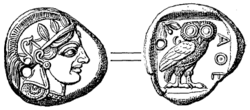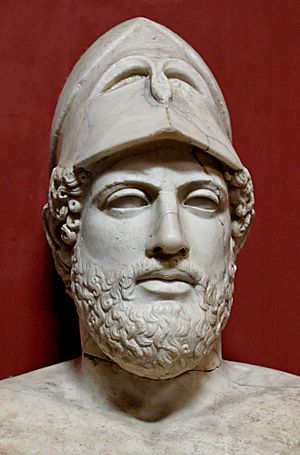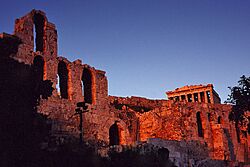Fifth-century Athens facts for kids
Fifth-century Athens was a special time for the Greek city of Athens, lasting from 480 to 404 BC. It's often called the Golden Age of Athens or the Age of Pericles. During this period, Athens became very powerful politically, its economy grew, and its culture shined.
This amazing time began in 478 BC, right after the Persians were defeated in an invasion. Athens led a group of city-states called the Delian League. Their goal was to protect the Greek cities in Asia that had been freed from Persian rule.
After making peace with Persia in the mid-5th century BC, the Delian League changed. What started as an alliance of independent cities became more like an Athenian empire. Athens moved the League's money from Delos to Athens. This money helped build the famous Acropolis, paid many citizens for public work, and kept Athens as the strongest naval power in the Greek world.
With money from its empire, strong military, and smart leadership from the statesman Pericles, Athens created some of the most important cultural works in Western history. Famous playwrights like Aeschylus, Sophocles, and Euripides lived and worked in Athens during this time. So did historians Herodotus and Thucydides, the doctor Hippocrates, and philosophers Plato and Socrates. Athens was named after its protector goddess, Athena.
Contents
A Time of Greatness
During Athens' Golden Age, military and foreign affairs were mostly handled by ten generals. These generals, called strategoi, were elected every year. They planned military trips, met with leaders from other states, and managed diplomatic talks.
Pericles became a very important leader. He was elected general in 445 BC and held that position until he died in 429 BC. He was a fantastic speaker, which helped him convince people in the Assembly.
One of Pericles' popular changes was allowing poor Athenians to hold public jobs. He also created a special payment, called misthophoria, for citizens who served as jurors in courts. This meant people could work for the public without worrying about money. This system kept the courts full and gave many citizens experience in public life. Under Pericles, Athens became the most important city in the Greek world, known for its amazing culture and democratic government.
In Athens, the citizens governed themselves directly. They made decisions about the state in the Assembly. Athenian citizens were free and had to obey only their laws and respect their gods. Everyone had freedom of speech in the Assembly. This meant "the word of a poor person had the same worth as that of a rich person."
To make sure everyone could take part, especially the poorer citizens, Athenian democracy helped them in several ways:
- Public workers received salaries.
- Work was found and provided for the poor.
- Land was given to villagers who had lost theirs.
- Help was given to war widows, people with disabilities, orphans, and those in need.
To make sure everyone was equal and to prevent corruption, most public jobs that didn't need special skills were chosen by a lottery system. Also, people who were chosen for a political group would take turns serving in all the different roles. This made sure that the government could run smoothly, no matter who was in charge.
The historian Thucydides (who lived from about 460 to 400 BC) wrote about this time. He said that "Everyone who is capable of serving the city meets no impediment, neither poverty, nor civic condition..." This shows how much equality was valued.
How Athens Was Organized
Public Officials
The magistrates were people who held public jobs in the Athenian government. They were carefully watched by the public. Most magistrates were chosen by a lottery using black and white beans. If you drew a white bean, you got the job. This system helped stop rich people from using their influence or making deals to get jobs.
Only two types of jobs were chosen by election in the Popular Assembly: the strategoi (generals) and finance magistrates. These jobs needed special skills. A magistrate's job usually lasted only one year. Pericles was an exception because he was re-elected year after year. At the end of their term, magistrates had to explain how they managed their duties and public money.
The most respected old jobs were the archontes, or archons. In earlier times, they were the main leaders of Athens. But during Pericles' time, they lost much of their power, though they still led court hearings.
Every year, citizens elected ten strategoi, or generals. They served as both military leaders and diplomats. This was the position Pericles used to shape Athens in the 5th century BC.
There were also many other public officers. More than forty managed the government, and over sixty policed the streets, checked markets, weighed goods, and carried out arrests.
The People's Assembly
The Assembly was the first part of Athens' democracy. In theory, all Athenian citizens could attend. However, it's thought that about 6,000 people gathered at most. They met on a hill called Pnyx, across from the Acropolis. Meetings sometimes lasted all day. The Assembly met forty times a year.
The Assembly decided on new laws and rules. These decisions were based on older laws already in place. New laws were voted on in two steps: first, the Assembly voted, and then the Council gave its final approval.
The Council or Boule
The Council, also called the Boule, had 500 members. Fifty members came from each of the ten tribes. They acted like an extension of the Assembly. These members were chosen by chance, using the same bean lottery system. They were sometimes called "councillors of the bean" but officially known as prytaneis.
The council members looked at new law ideas, watched over the magistrates, and made sure daily government tasks were done correctly. They also handled Athens' foreign affairs. They met on Pnyx hill, in a special area. The fifty prytaneis in charge sat on stone platforms.
Money Matters

Athens' government had money thanks to the treasury of the Delian League. This money was first kept on the island of Delos. But Pericles moved it to Athens, saying Delos wasn't safe enough. This caused problems within the League, and some city-states rebelled. Athens quickly fought back. Some historians believe this is when the Delian League truly became an Athenian Empire.
Athens also got money from customs fees and fines. During wartime, rich citizens had to pay a special tax. These wealthy citizens also regularly paid other taxes for the good of the city. This system was called liturgy. These taxes helped pay for and maintain the triremes (fast warships) that gave Athens its strong navy. They also paid for and supported the choruses for large religious festivals. Rich Athenian men often saw it as an honor to pay for triremes or festivals, and they would even compete to donate more.
Athens also benefited from being close to the trading port of Piraeus. The Athenian government collected a tax on goods passing through this port. At Piraeus, this tax was 1% or more on goods.
Life in Pericles' Athens
The wealthy people in Athens lived simply, without the great luxuries seen in other ancient states. There were few huge fortunes, and land ownership was spread out. Most citizens owned a good portion of the land. The economy relied on trade by sea and making goods. Farming was also important, but Athens had to import most of its food because it couldn't grow enough for everyone.
The government managed all the main religious festivals. The most important was the Panathenaia, honoring the goddess Athena. This festival happened once a year in May and every four years in July. During it, the city presented a new veil (peplos) to an old wooden statue of Athena. The famous sculptor Phidias showed this procession on the Parthenon Frieze, which is now in the British Museum. In the July Panathenaia, big competitions were held, including gymnastics and horseback riding. Winners received special jars (amphorae) filled with sacred olive oil. Another important festival was the dramatic Dionysia, honoring Dionysus, where tragedies and comedies were performed.
Education
Boys started their education at home until they were seven. Then they went to school. They had several teachers who taught them to read and write, along with subjects like mathematics and music. Boys also had physical education classes to prepare them for future military service. These activities included wrestling, racing, jumping, and gymnastics. At eighteen, they joined the army and learned how to use weapons. Physical education was very intense, and many boys became strong athletes. Besides these required lessons, students could also learn from the great philosophers and speakers of the time. Some poor boys had to stay home and help their families. However, even poor people like Aristophanes and Socrates became famous and successful.
Women
The main job for free women in Athens was to marry and have children. Marriage was important for continuing the family. Married women were in charge of running the household every day. They were responsible for the family's well-being, caring for children, weaving cloth, and making clothes. They also looked after sick family members, supervised slaves, and made sure there was enough food. In Athenian marriages, either the husband or wife could legally start a divorce. The woman's closest male relative could also do so, even if the couple didn't want it. After a divorce, the husband had to return the dowry (money or property the wife brought to the marriage) or pay interest so the woman could support herself and remarry. If there were children, they stayed with their father.
Athenian women had some rights, but they were not equal to men. They could not vote, hold political office, or be part of the law courts or the Assembly. Women were expected to stay separate from men. However, this was hard for many Athenians. Only very wealthy families could afford to keep their women mostly at home. Most women had to leave the house often, for example, to get water or wash clothes.
The worship of Athena Polias (the city's goddess) was very important in Athenian society. Women played a key role in this worship. The priestess of Athena held a very important position and could use her influence to support political ideas. For example, before the Battle of Salamis, the priestess of Athena encouraged Athenians to leave the city by saying that Athena's sacred snake had already left the Acropolis.
Arts and Learning
Historians believe the 5th and 6th centuries BC were the Golden Age for sculpture and architecture in Athens. During this time, the number of works and their beauty and perfection were outstanding. Most of these works were religious, mainly sanctuaries and temples. Some examples include:
- The rebuilding of the Temple of Olympian Zeus.
- The rebuilding of the Temple of Apollo in Delphi, which was destroyed by an earthquake.
- The rebuilding of the Acropolis of Athens, a marble city built to honor the gods. The Acropolis had been burned by the Persians and was in ruins for over 30 years. Pericles started its reconstruction using white marble from a nearby quarry. The best architects, sculptors, and workers were brought together. The construction took 20 years and was paid for by the Delian League.
Sculpture
Phidias is thought to be the greatest sculptor of this time. He created huge statues made of gold-plated ivory, which were highly praised. These included a statue of Athena inside the Parthenon and a statue of Zeus in the Sanctuary of Olympia. The Zeus statue was considered one of the wonders of the world.
To protect the marble of these sculptures, oil containers were placed in the temples so the ivory wouldn't crack. Other great sculptors of this century were Myron and Polycletus.
Pottery
During this period, many ceramic pieces were made. Large numbers of Amphorae (jars) were produced because of heavy trading with other cities around the Mediterranean Sea. Many amphorae from this time have been found in ancient ports and in the Aegean Sea. This period also saw many white background ceramics, which were more delicate than the earlier yellow and black ones. These ceramics were often used for perfume or for burial rituals, including grave decorations. We know there were many great painters too, but their works, both frescos (wall paintings) and other paintings, have been lost.
Theatre
Theatre reached its peak in the 5th century BC. Pericles supported theatre with practical and financial help. The wealthiest families had to pay for and support the choruses and actors. This way, Pericles kept the tradition that plays helped educate people morally and intellectually. Plays were usually made by men and for men, and they often reinforced the idea of a male-dominated society.
Athens became the great city of Greek theatre. Plays lasted eight hours and were part of competitions where a jury chose a winner. The temporary theatres were simple, but permanent ones in ancient Athens became more grand. Plays were performed by at most three actors, who wore masks to show their characters. They were joined by a chorus who sang and danced.
The famous playwrights from this time whose plays still exist are:
Philosophy
The Golden Age produced some of the most famous Western philosophers ever. The most important were Socrates, whose ideas are mostly known through his student Plato's writings; Plato himself; and Plato's student, Aristotle.
Other important philosophers of the Golden Age included Anaxagoras, Democritus (who first wondered what makes up all matter, an early idea of the atom), Empedocles, Hippias, Isocrates, Parmenides, Heraclitus, and Protagoras.
In the second half of the 5th century BC, teachers who taught different sciences and knowledge for a fee were called sophists (meaning "expert" or "man of wisdom").
During this time, Athens was known as the "school of Greece." Pericles and his partner Aspasia met with great Athenian thinkers and other Greek and foreign scholars. These included the philosopher Anaxagoras, the architect Hippodamus of Miletus (who rebuilt Peiraeus), and historians Herodotus, Thucydides, and Xenophon.
Athens was also a center for public speaking. From the late 5th century BC, public speaking became an art form. There were logographers who wrote speeches for others. This became a profitable job. For example, the logographer Lysias made a lot of money from his work. Later, in the 4th century BC, speakers like Isocrates and Demosthenes also became famous.
The End of the Golden Age
From 461 BC until his death in 429 BC, Pericles was active in the government of Athens. This was a time of great splendor and a high standard of living. While things were good inside Athens, other members of the Delian League were becoming more and more unhappy. Athens' foreign policies didn't always work out well. Athens was the city-state that controlled and ruled over the rest of Greece, and these oppressed cities wanted their freedom.
Earlier, in 550 BC, a similar league of cities in the Peloponnessus, led by Sparta, had been formed. This Peloponnesian League took advantage of the unhappiness among Greek city-states and began to challenge Athens. After a long series of poorly managed policies (around 431 BC) and the resulting Peloponnesian War, Athens finally lost its independence in 338 BC. This happened when Philip II of Macedonia conquered the rest of Greece.
See also
- Greece in the 5th century BC
 | Calvin Brent |
 | Walter T. Bailey |
 | Martha Cassell Thompson |
 | Alberta Jeannette Cassell |



